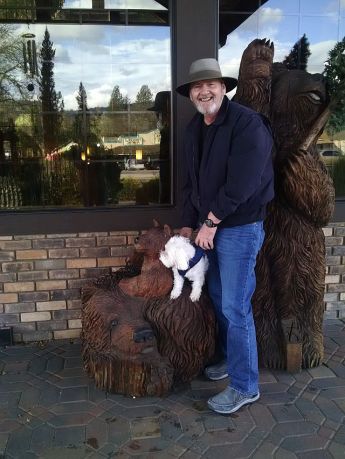
Is this a scary story? ‘Cause if this is a scary story I’ll hide under the covers.
So there we were, cruising Highway 49, singing old Monkees’ tunes since there are no new Monkees’ tunes, and remarking about how incredibly soggy Northern California had become after a very rainy season.
We debated the merits between a straight shot to Sacramento versus exploring along the Gold Route. We chose the latter.

I admit the whole “old Monkees tunes” thing was just a set up so I could use this terrible pun. Sorry for the ear worm.
Our destination was a town I’ve passed through many times but never slowed down to look around – Chinese Camp.
Chinese Camp is south of the far better known Gold Rush town of Sonora. It’s what you might call a “quasi-ghost town.”
While there are a few people still living in the area, the town itself is defunct, a place full of lonesome wind sounds, old cemeteries, dilapidated wood frame houses, scraggly overgrowth and dust. Lots of dust.
It dates back to the mid-1800s when thousands of Chinese workers were brought to the US as cheap labor to work on railroads and in mines. These men – most were males – did not intend to immigrate; rather, they were sojourners, who expected to stay a few years, make some money and then return to the ancestral land.
In early 1849, California had only fifty-four Chinese. By 1876, the Chinese in the United States numbered 151,000 of whom 116,000 were in the state of California.
Chinese Camp itself was once home to more than 5,000 Chinese miners. At its peak, the town extracted nearly $3 million in gold. Now for our daily dose of irony: according to the 2010 Census, there is not a single Chinese person or person of Asian extraction living in town, the last Chinese having beat feet almost 90 years ago.

Precariously leaning to the side.
Chinese Camp is best remembered, if remembered at all, as the site of a big Tong War in 1856.
In Chinese, the word tong means “hall” and frequently refers to fraternal organizations or secret societies often tied to criminal activity.
In part, the popularity of these societies may have been due to the extreme prejudice and hostility faced by the Chinese workers in young America.
There were many different Tongs and they acted sometimes like labor unions, sometimes like benevolent societies and sometimes like plain old street gangs competing for “turf.”

The General Store.
To be sure, the inter-Tong competition and violence, along with the toxic racism on the West Coast led to many Chinese moving to the East Coast and the subsequent establishment of “Chinatowns” in the big cities such as New York and Boston.
But I digress.
Chinese Camp’s Tong war took place on September 26, 1856 in a meadow outside of town. It was caused when one company of Chinese miners rolled a boulder onto the claim of another company and refused to move it.
The animosity between the groups kept escalating. The Columbia Gazette reported that one Tong had even hired professional instigators to taunt and antagonize the other:
“Before the battle the fifteen white mercenaries painted themselves yellow, put on Chinese costumes, and hung a yard of horsehair tail down their backs in a mocking depiction of a Chinese queue.”
The fight involved about 1,200 men with 4 killed and many wounded. The death toll was limited because Chinese were not permitted guns; consequently, the battle was fought with pitchforks, rakes, mining tools and farm implements. It was the biggest thing to happen in Chinese Camp then or now.

A photo of Chinese miners in America from ChineseBlogSpot.
For much of the mid-1800s, Chinese Camp was a major transportation hub with train service, regular stage coach runs and all the trappings of a very rowdy, rough-and-tumble western town. But when the gold boom went bust, the town slowly devolved to what it is today. The final coffin nail was the emergence of the automobile which obviated the need for train service.
Max, the AJF and I wandered around the town, figuratively (and in Max’s case, literally) sticking our noses into the old buildings, the train station, schoolhouse and post office. We walked up down the streets which had that hollow type of quiet that you get in abandoned towns. The gloomy weather didn’t make the experience any more cheery.
We saw only a few souls and they looked none too friendly, supporting the allegation that Chinese Camp had become a bit of a center for meth labs in the Sierra foothills. It could also be that they were people who didn’t like Maltese dogs.
But it was the town’s official cemetery that creeped us out. To establish context, remember that most of the graves dated to pre-Civil War years. None of the names were Chinese – they had their own cemetery.

Part of the Chinese Camp church graveyard. (Photo by Dolores Steele)
Here’s the odd thing: on a few of the old graves there were fresh flowers!
Huh? Does that mean a family member has stayed true for 150 years? Was it someone from the area?
But then on another grave – according to the inscription it was the burial place of a small child who died in the 1800s – there was a relatively new teddy bear on the grave along with a fresh bouquet!
As we paused and wondered about the back story, the Malt started a low grumbling sound in his throat. Why was he distressed?
Apparently we were not the only ones who got chilly-willys (and I don’t mean the penguin) down our backs in Chinese Camp. Later on we checked with Dr. Google who noted that even the Discovery Channel had done a story about the place and reputedly “measured” (yeah, right) a very high level of psychic energy in this cemetery as well as a nearby church.
For us, psychic measurement stuff counts right up there with the Tooth Fairy but we did admit to being uncomfortable during our visit. However, the faces of the folks we saw in town didn’t invite casual conversation so we’ll probably never know what’s going on in the cemetery.
Meanwhile, the skies were again filling with ominous clouds. We figured it was time to boogie down the Strasse.
Besides, Jet was still waiting for Max.

I tried to convince the Malt that the carving on the lower left was a giant Golden Retriever. He wasn’t buying it.
Categories: The Dog From Rancho Cucaracha

Good grief…what a place to take a delicate soul like Max. He could be scarred for life and need additional dog treats to assuage his misery.
LikeLiked by 1 person
Curiously enough, Max made the same argument and demanded the same compensation that you discuss above. I now believe you two are in cahoots or maybe one of your pooches is counseling the Malt on how to extract the maximum treasure with minimum effort.
LikeLiked by 1 person
Interesting history of the area. I have “Long Island Medium” in the background right now, and she just said, “Children and animals are very in touch with spirit.” And then I read your line about Max grumbling. That is eerie.
LikeLiked by 1 person
Like the AJF, Max grumbles all the time but there’s usually a reason ( beyond just being spoiled). Dogs do seem to have an additional sense or maybe it’s just better hearing that makes them seem more acutely aware of their environment. Sometimes places are just down right creepy and while we’re not at all believers in ghosts or spirits (except Jack Daniels) or the supernatural, we both were sensitized in Hawaii that certain places were indeed strange and different. Boo!
LikeLiked by 1 person
Whew! I got the creeps just reading about the cemetery. Good thing Max was there to confirm it.
LikeLiked by 1 person
Then we realized that Max, all white, looked like a small canine ghost. Whooooooo…
LikeLiked by 1 person
hahah! You crack me up!
LikeLiked by 1 person
Max, Max, Hellllllo Max. Get with the program (or progrom). In that area, they hand out golden samples (like liquids -Chardonnay and Sauvignon Blanc come to mind). You mean to tell me that when you were around those mines, you didn’t get golden samples of their output? What are we going to do with you, Max?
LikeLike
You have a point. But you need to understand that Max is not a retriever. Unlike Jet, Max does not retrieve anything. Sure, it would be nice to say, “Max, go retrieve a nice Ironstone Chardonnay” or please retrieve some bullion. But if you tried that, Max would go Tupac all over you and start in with “Yo, I’m a receiver not a retriever. Fetch it yo own dam self” Mike drop.
LikeLike
I’m with Max on this! If you want things retrieved, go get yourself a retriever.
LikeLiked by 1 person
“So sayeth the Great Pyrenees, so sayeth us all.”–Max, probably.
LikeLike
What??? No love at all for the “Now I’m a retriever pun?” Man, this is a tough crowd.
LikeLike
How nice to know you are settled in sundrenched California.
I have missed reading about Max treating you like a servant!
Gold country and Chinese Camp do not attract me for some reason, while the gold might be useful zombie like residents might be offputting.
You may prefer my (almost) daily ramblings on https://adullamite.blogspot.co.uk/
Blogger & WordPress do not allow me to link to that!
LikeLiked by 1 person
Treating me like a servant? Not at all accurate. I have never risen to the status of a servant and would consider that a major promotion. I settle with having the small dog barely acknowledge my existence as other than a food supplier. Of course that’s pretty much the same with the AJF. Maybe I need a better PR firm.
LikeLike
Awesome article, will have to go check it out when the wife (ACF–Alpha Chinese Female) and I visit Cali this summer.
LikeLiked by 1 person
Seems like “alpha” and “female” show up as common themes. Hmmm. I’d make a comment but there are way too many, uh, delightful women, who check out this silly dog blog.
LikeLike
Ear worm notwithstanding, what a fascinating and curious adventure. 19th century headstones have always fascinated me and speak volumes about a time when life was not easy to endure, especially for immigrants. To this day I cannot pass a cemetery that doesn’t pique my interests and the creepier the better.
LikeLike
Animals are very sensitive hearing seeing and feelings we don’t always acknowledge sooo….who knows what caused Max his discomfort better not to have stayed around to find out….ELLE and her Bellarina
LikeLiked by 1 person
Yup! And if anything really threatening showed up Max would run away a d leave me to deal with it.
LikeLike